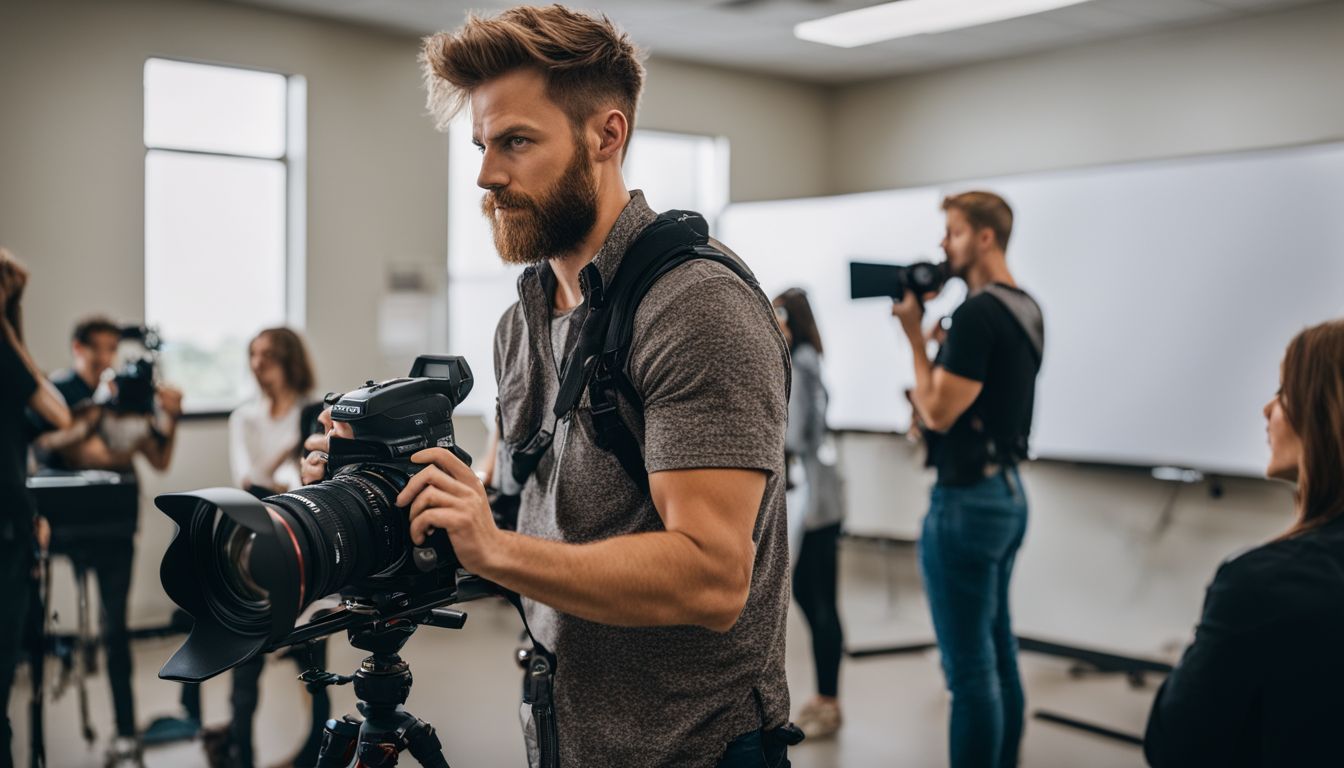Are you completely bewitched by the compelling art of visual storytelling and harbouring dreams of becoming a videographer, yet unsure where to begin without following the traditional route of formal education? Rest assured, you’re not alone.
In fact, countless professional videographers have carved their own path in this dynamic field through self-education, consistently honing their skills as they adapt to an ever-changing landscape.
This blog post is your trusty guide on the exhilarating journey towards becoming a self-taught videographer; it’s brimming with insights into overcoming challenges and harnessing advantages, along with tangible tips for success.
Intrigued? Together let’s delve into the captivating world of DIY cinematography.
Key Takeaways
- Self-study and online resources are key to becoming a self-taught videographer.
- Challenges of being self – taught include the lack of formal education and limited access to mentorship, but these can be overcome with feedback and focusing on accomplishments.
- The benefits of being self-taught include flexibility in learning different styles and techniques, developing a unique creative vision, and building a diverse portfolio through self-directed projects.
The Journey of Becoming a Self-Taught Videographer

We gained knowledge and skills through self-study, learning from online resources and tutorials.
Gaining knowledge and skills through self-study
Self-study can help us gain knowledge and skills. We might not go to a school, but we can still learn. Many great videographers did not study in a formal way. They taught themselves.
Books and online courses are helpful tools for self-study. Adobe is a good place to learn technical stuff about videography. We need practice to be good at this job too, video shooting takes effort! The more we shoot videos, the better we get at it!
Learning from online resources and tutorials
Learning from online resources and tutorials is a key part of being a self-taught videographer.
- We can find many free videos on sites like YouTube that teach basic to advanced skills.
- Websites such as Adobe offer loads of tutorials that can help us learn new things.
- We don’t need to pay for a class or program, many helpful guides are available for free online.
- Online resources give us the chance to learn at our own pace and style.
- Independent videography training allows us to choose topics we are most interested in.
- There are plenty of eBooks and articles that provide tips and guides on becoming an independent videographer.
- We can join online forums or groups where other self-taught cinematographers share their experiences and advice.
- It is possible to get DIY videography training through virtual workshops or webinars.
- Online platforms provide tools that help us work on projects, improve our passion, and develop our skills.
How to Start Being a Videographer
Being a videographer can start as a passion or hobby. Here are some steps for you to follow:
- Start with your passion: Do you love to shoot videos? Your journey starts here.
- Get a camera: The gear used by many videographers may be different. So, get a basic camera to start.
- Learn the basics: Use Adobe and other online resources to learn basic skills.
- Practice, practice, practice: Shoot videos at every chance you get!
- Write a project overview: This helps clarify what your video should achieve.
- Prepare for interviews: If your video needs them, write good interview questions.
- Keep learning: Being self-taught means always updating your skills.
- Share your work: Ask others for feedback on your work.
- Build a diverse portfolio: Show off your best shots in different settings and styles.
Challenges of Being a Self-Taught Videographer

One challenge of being a self-taught videographer is the lack of formal education and credentials, which can make it difficult to establish credibility in the industry.
Lack of formal education and credentials
Not having a school degree might seem tough. Some people think you need papers to show your skills. This is not always true for videographers. There are many ways to learn on your own.
Using the internet, books and free courses can help a lot. But, without a formal education, it’s hard to prove you know what you’re doing. It takes time to build trust with people who might hire you for work.
They often want someone that has been tested in a classroom setting or by other professionals first.
Limited access to mentorship and critique
Being a self-taught videographer is hard with no help. We can’t ask teachers for advice or get tips from classmates often. It’s tough to know if our work is good without feedback from others.
One of the secrets to mastering videography on your own is seeking critique outside of school. This could be online forums, local groups, or even friends who also have an interest in video making.
Feedback helps us grow and improve our skills faster than just working alone would allow.
Overcoming self-doubt and imposter syndrome
Self-doubt and imposter syndrome are common in self-taught videographers. We may feel like we’re not good enough or not a ‘real’ professional because we didn’t go to school for it.
It’s crucial to know that many successful people feel this way too, so you’re not alone.
To overcome these feelings, focus on your accomplishments. Look at the videos you’ve produced and all the skills you’ve picked up along the way. We learn from every video we make, so each one is a small win.
Don’t compare yourselves with others; our path is unique and valid as theirs! Staying positive about our growth helps us gain confidence over time.
Benefits and Advantages of Being a Self-Taught Videographer
Flexibility and freedom in learning different styles and techniques, developing a unique creative vision, and building a diverse portfolio through self-directed projects. Read more to discover the advantages of being a self-taught videographer.
Flexibility and freedom in learning and exploring different styles and techniques
Being a self-taught videographer brings many perks. One of them is getting the chance to explore and learn different styles and techniques at our own pace. We’re not tied down by strict class schedules or fixed course outlines.
Instead, we have the freedom to dive deep into areas that catch our interest the most. We can spend hours trying out new camera angles, playing with lighting effects, or mastering complex editing tools like Adobe.
This flexible way of learning lets us be more creative too. It helps us develop a personal style that stands out in this crowded field. Having unique work is often what grabs clients’ attention first! So don’t be afraid to experiment and push your boundaries as an independent videographer.
Developing a unique and personal creative vision
Developing a unique and personal creative vision is an essential aspect of being a self-taught videographer. It involves finding your own style, aesthetic, and storytelling approach that sets you apart from others.
By experimenting with different techniques, exploring various genres, and pushing the boundaries of your creativity, you can cultivate a distinct visual identity in your videos. This allows you to express yourself creatively and leave a lasting impression on your audience.
Developing this vision takes time and practice but is crucial for setting yourself apart in the competitive world of videography.
By continuously learning and improving your skills while staying true to your artistic instincts, you can create videos that reflect who you are as a person and as an artist. Whether it’s through color grading choices, composition techniques, or narrative structures, developing a unique creative vision enables you to connect with viewers on a deeper level by creating content that speaks to them emotionally and visually aligns with their preferences.
Embracing experimentation and embracing failure as part of the learning process will help shape your creative voice over time.
Remember that having a personal creative vision doesn’t mean limiting yourself to one specific style or technique; it means constantly evolving and adapting while maintaining authenticity.
Drawing inspiration from other artists in different fields like photography, music or writing can also influence how you approach videography projects. Ultimately, developing a personal creative vision allows you to stand out from the crowd by producing work that is truly yours – showcasing both technical skillset alongside emotional depth – making it easier for those watching to recognize who made the video without even seeing credit.
Building a diverse portfolio through self-directed projects
As self-taught videographers, we have the freedom to explore different styles and techniques, which allows us to build a diverse portfolio. Through self-directed projects, we can choose the subjects that interest us and showcase our unique creative vision.
Whether it’s capturing nature, documenting events, or telling stories through video, we have the flexibility to pursue our passions and create a body of work that reflects our individuality.
By constantly learning and improving our skills through self-study and practice, we can continue to expand our portfolio and demonstrate our growth as videographers. And with each project we complete, we gain valuable experience that further enhances our abilities in this field.
Tips for Becoming a Successful Self-Taught Videographer
Set clear goals, seek feedback from professionals and peers, continuously update your skills, network and collaborate with other creatives, and stay motivated and dedicated to your craft.
Set clear goals and objectives
To become a successful self-taught videographer, it is important to set clear goals and objectives. This will help guide your learning journey and ensure that you are focused on what you want to achieve.
By defining your goals, whether it’s mastering a specific technique or creating a portfolio of work in a particular genre, you can break down the necessary steps and tasks needed to reach those objectives.
Setting clear goals also allows you to measure your progress and stay motivated along the way. So take some time to think about what you want to accomplish as a videographer, and then outline the specific goals and objectives that will help get you there.
Seek feedback and critique from peers and professionals
To become a successful self-taught videographer, it’s important to seek feedback and critique from your peers and professionals in the industry. This feedback can help you improve your skills, identify areas for growth, and gain valuable insights from experienced individuals.
By sharing your work with others and being open to constructive criticism, you can receive valuable advice that will help you refine your techniques and develop your unique style. Collaborating with other creatives also allows you to learn from their experiences and expand your network within the videography community.
Additionally, seeking feedback helps build confidence in your abilities as a self-taught videographer by receiving validation for the progress you have made on this self-directed journey of learning.
Continuously learn and update your skills
To become a successful self-taught videographer, it is crucial to continuously learn and update your skills.
- Stay curious: Keep exploring new techniques and styles in videography. Stay up-to-date with the latest trends and advancements in the field.
- Learn from mistakes: Analyze your work critically, identify areas for improvement, and learn from any mistakes or shortcomings.
- Seek feedback: Connect with other videographers or professionals in the industry to get constructive feedback on your work. This can help you identify blind spots and grow as a videographer.
- Take online courses: Enroll in reputable online courses or tutorials that focus on specific aspects of videography. There are numerous platforms like Adobe, which offer tutorials for different skill levels.
- Practice regularly: Dedicate time to practice your videography skills consistently. With practice, you’ll develop more confidence and refine your techniques.
- Attend workshops or webinars: Participate in workshops or webinars conducted by experienced professionals. These events often provide valuable insights and practical knowledge.
- Experiment with different projects: Engage in diverse projects that challenge you creatively. This will push you out of your comfort zone and help you acquire new skills.
- Network with other creatives: Connect with fellow videographers, photographers, editors, and filmmakers. Collaborating with others can expose you to different approaches and inspire new ideas.
- Stay updated on industry news: Subscribe to industry-related newsletters, follow relevant blogs or social media accounts to stay informed about the latest developments in videography.
Network and collaborate with other creatives
Collaborating with other creatives is an important aspect of becoming a successful self-taught videographer. Here are some tips for networking and collaborating:
- Attend industry events and workshops to meet other videographers and filmmakers.
- Join online communities and forums where you can connect with like-minded individuals.
- Utilize social media platforms to showcase your work and reach out to potential collaborators.
- Offer your services as a videographer for free or at a discounted rate to gain experience and build relationships.
- Seek collaborations with photographers, musicians, writers, or other artists to create multidisciplinary projects.
- Participate in group projects or film festivals to broaden your network and showcase your work.
- Be open to feedback and constructive criticism from your collaborators; it can help you grow as a videographer.
- Consider joining professional associations or organizations related to the film industry for networking opportunities.
Stay motivated and dedicated to your craft
To become a successful self-taught videographer, it is crucial to stay motivated and dedicated to your craft. This means consistently putting in the effort and time to improve your skills.
Remember that being self-taught requires continuous learning and practice. Stay updated with the latest trends and techniques in videography by actively seeking new knowledge and resources.
Set goals for yourself and work towards achieving them, celebrating each milestone along the way. Surround yourself with other creatives who share your passion and collaborate on projects together.
Conclusion.
In conclusion, anyone can become a self-taught videographer with the right passion and effort. While formal education may provide certain advantages, learning independently allows for flexibility and creative exploration.
By setting clear goals, seeking feedback, continuously improving skills, networking with others in the field, and staying dedicated to your craft, you can succeed as a self-taught videographer.
So go out there and start capturing those amazing moments on camera!
Is Being a Self-Taught Videographer a Valuable Skill?
Becoming a self-taught videographer is a valuable skill in today’s digital age. The value of videography lies in its diverse applications across various industries, from entertainment to marketing. With the freedom to learn at your own pace and the abundance of online resources available, acquiring this skill opens up opportunities for creative expression and professional growth. Whether you aspire to showcase your talent or enhance your business, the value of videography should not be underestimated.
Can I Apply Exposure Settings Techniques from Photography to Videography?
When transitioning from photography to videography, understanding exposure settings for great photos becomes crucial. While the basic concept remains the same, videographers need to embrace adjustments that allow for smooth transitions between multiple frames. Balancing exposure, shutter speed, and ISO settings is key to creating visually captivating videos while still maintaining the desired aesthetics.
Can I Learn to Use Equipment as a Self-Taught Videographer?
Yes, you can learn to use videographer equipment as a self-taught videographer. With the abundance of online resources, tutorials, and forums dedicated to videography, learning the ins and outs of equipment operation is possible. Engaging in self-paced learning and practicing hands-on will gradually enhance your skills and enable you to master the art of using videographer equipment effectively.
FAQs
1. Can I become a videographer by teaching myself?
Yes, it is possible to become a videographer through self-teaching and practice.
2. What are some resources for learning videography on my own?
There are many online tutorials, books, and courses available that can help you learn videography techniques and skills at your own pace.
3. Do I need expensive equipment to be a self-taught videographer?
No, you don’t necessarily need expensive equipment to start learning videography. A smartphone or basic camera can be sufficient for practicing the fundamentals.
4. Is it necessary to have formal education in order to become a successful videographer?
While formal education can provide valuable knowledge and opportunities, it is not necessary for becoming a successful self-taught videographer. Passion, dedication, and practice can also lead to success.
5. How long does it take to become proficient as a self-taught videographer?
The time it takes to become proficient as a self-taught videographer varies depending on individual effort and commitment. With regular practice and continuous learning, you can start producing quality videos within months or years of dedicated study.






